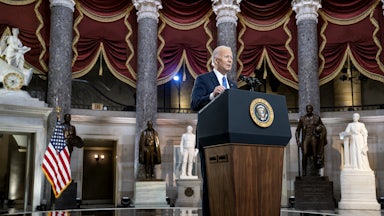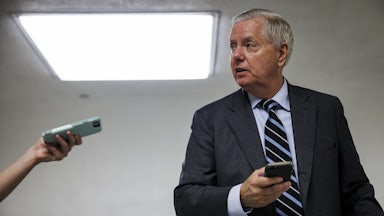As we begin this election year, the most maddening question in American politics is this: How is it that we’re on the precipice of an authoritarian takeover of democracy by one political party and the electorate doesn’t seem to care?
It’s staggering, but apparently true. You (because you’re the kind of person who reads a column like this one) and I are depressed and terrified beyond belief at what’s happening to this country. And certainly, there are millions like us. Every week, nearly every day, we see some Republican do or say something new and outrageous that puts their contempt for democracy—and their eagerness to steamroll it, if need be, to win elections—on display, and we’re mortified.
But the people who have these concerns tend to be highly politically engaged, and most likely liberals or Democrats. There was a poll last fall showing that while the vast majority of Americans think democracy is under threat, people are pretty evenly split on which party is to blame. And independents, by 41 to 37 percent, said Democrats are more to blame.
Where are people getting this from? Most likely it’s what they’re listening to and watching. The right-wing media, from Fox News to Sinclair broadcasting and all the rest, have created an inverted-reality world based on the principle that fascists have used throughout history: If your side is doing something outrageous, the best way to make people not notice is to accuse the other side of doing what you are in fact doing. A lot of people buy it.
It’s also a fact that there just aren’t as many liberals in this country as there are conservatives. Gallup has been polling this every year since 1992. The numbers are better today than 30 years ago, but only somewhat. In Gallup’s survey, 36 percent of respondents said they were conservative, 35 percent moderate, and 25 percent liberal. That 25 is up from 17 percent in 1992, so that’s good (the percentage of moderates has fallen, and the percentage identifying as conservative has stayed the same).
Toss in the added fact that liberals tend to cluster in cities, certain suburbs, and university towns, and you have a political situation that I noted in a column a few weeks ago. There are 192 safe Republican seats in the House of Representatives but only 165 safe Democratic ones, leaving 78 swing districts, of which Democrats need to win 53 to get to 218.
This means that Democrats on the campaign trail have to pander to independents and moderates to a more substantial degree than Republicans do. That’s why Democrats try to run on bringing the country together and working toward shared bipartisan goals, as Joe Biden has professed on so many occasions. That’s the kind of pap that the mostly apolitical people in the middle want to hear from Democrats.
So that’s the maddening paradox: The people who need to be awakened to the Republican threat to democracy are the people who would rather not hear those kinds of discouraging words. By and large, these are voters who may be cynical about politics but not about themselves or their place in America. And they’re mostly pretty unsophisticated about politics, even though they think the opposite about themselves. They cling to bothsidesism as if it were some kind of revealed truth, they think that all politicians are corrupt and in it for themselves, and so on. Cynicism aids the right, in America, and in every society across history.
Biden’s terrific January 6 speech was a notable exception. As Walter Shapiro wrote at TNR last week, it could be a turning point in his presidency. But he needs to keep emphasizing the themes he hit last week. Meanwhile, Chuck Schumer is apparently going to hold a vote on voting rights bills. They’re not going to pass, which is a tragedy of immense proportion (and what a charade it will be to see Joe Manchin and Kyrsten Sinema vote for the bills and give floor speeches about democracy even while they’re letting them die at the hands of an avoidable filibuster). But the votes will at least keep the issue in the news and let Americans see where senators stand.
And the select committee on January 6 may make a difference here, depending on what it finds and makes public. Maybe it will turn up evidence of a damning quote from Donald Trump. Maybe it’ll prove that some GOP members of Congress helped plan the insurrection, which will attach specific faces to the war on democracy.
Biden and the Democrats have no choice now but to put democracy on the ballot and expose the GOP as its enemy. Maybe it will hurt them with independents. Obviously, if Covid-19 is still lingering next November and inflation hasn’t been tamed, nothing will matter.
But it may help. I suspect that many people don’t consider the extent to which Republicans are a threat to democracy because no one is telling them that on a regular basis. We saw in the wake of Biden’s speech last week the impact a president’s words can have. It drove the news for two days, Trump responded with a typically mendacious and corrupt statement, and it made for a fairly dramatic contrast. The democracy issue also carries the side benefit of Democrats being able to wrap their arms around the police (OK, the Capitol Police, but still, the police) and show America that it’s Republicans who are defending the people who tried to kill cops.
Fascists understand that you have to say something over and over and over for it to sink into the heads of average people. Democrats (the small-d kind, I mean, but I guess the big-D ones, too) have tended to assume that facts are self-evident and clear to decent people. They are not. Constant lies have to be confronted straight on, from Biden on down.
If they commit themselves to a stern defense of democracy, there’s a chance more people beyond the hyperengaged will wake up and begin to take it seriously, as well. If they do not, people will wake up, but on January 20, 2025, with Trump getting inaugurated after having lost but stolen victory away, and they’ll be shocked, and they’ll ask, from their fortress of cynicism, Gosh, how’d that happen?










